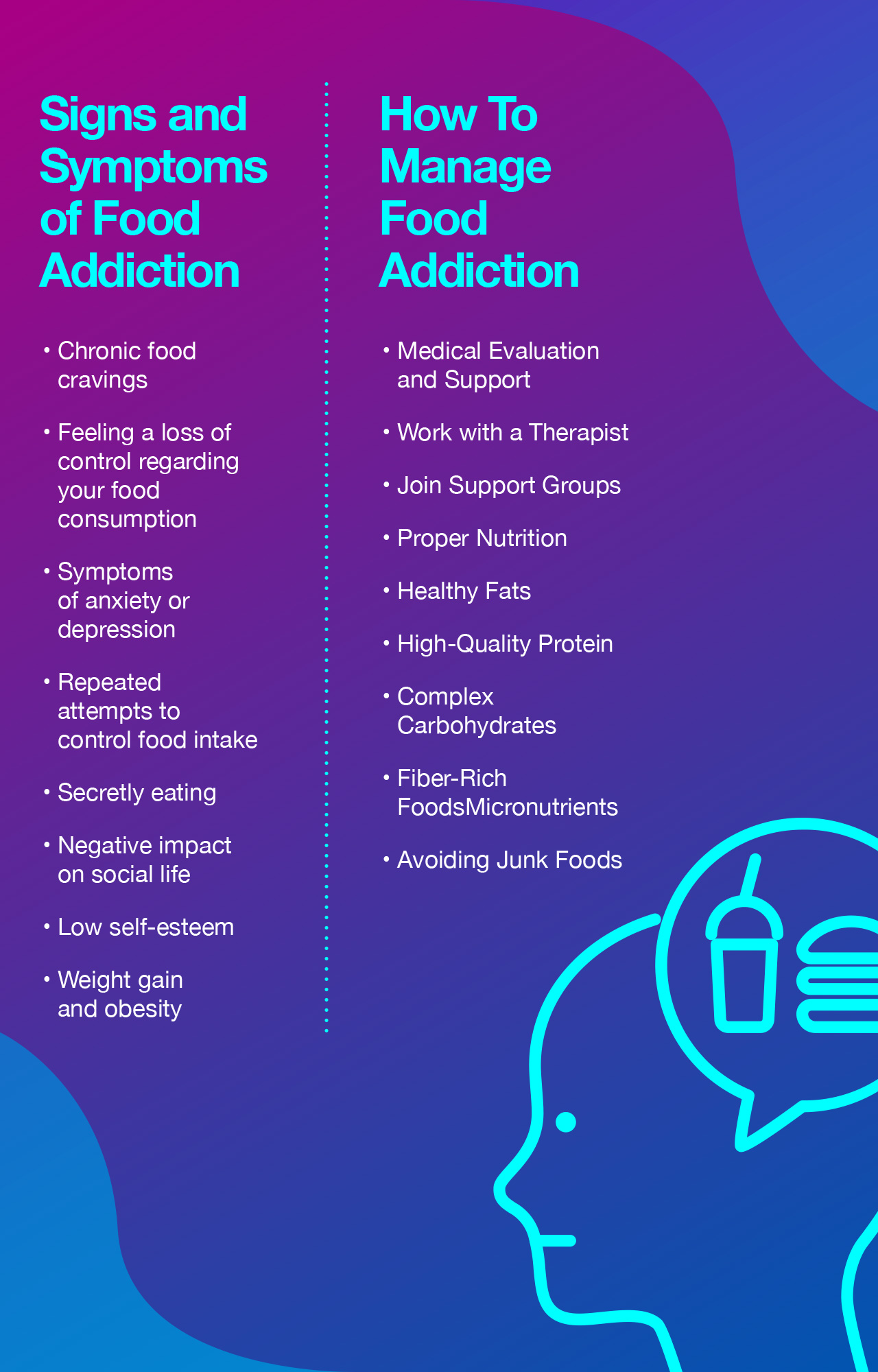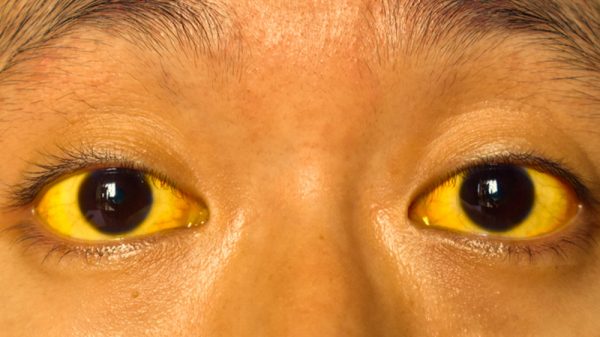When people think of addiction, they often think of drug addiction to addictive substances like opioids or amphetamines. The existence of food addiction is debated among experts, and the literature doesn’t necessarily come to a consensus about food addiction and its diagnosis. However, we do know that forms of food addiction do exist, and being addicted to food can lead to poor health outcomes.
The Science Behind Food Addiction
Food addiction has been studied, and there is scientific evidence that supports food addiction. A systematic review published in Nutrients reveals that food can have addictive properties (1)
Food activates the pathway in the brain that is associated with reward. When we eat, we experience a surge of dopamine. This is especially true for the consumption of foods that are high in sugar and fat.
For individuals struggling with food addiction, this feedback loop goes awry and the reward system essentially hijacks the reward center of the brain. This effect is similar to that of addictive drugs. This leads to compulsive overeating, to the detriment of health and well-being.
Food addiction is not formally recognized in the Diagnostic and Statistical Manual of Mental Disorders (DSM-5). However, research shows that food addiction and other eating disorders share common characteristics. (2) Food addiction also overlaps with characteristics of substance use disorders. (2)
Do You Think You Might Be Addicted to Food?
The signs and symptoms of food addiction can overlap with other conditions, like binge eating disorder, bulimia, and addiction to other substances. Here are a few signs and symptoms of binge eating disorder or food addiction.
- Chronic food cravings
- Feeling a loss of control regarding your food consumption
- Symptoms of anxiety or depression
- Repeated attempts to control food intake
- Secretly eating
- Negative impact on social life
- Low self-esteem
- Weight gain and obesity
How Can Food Addiction Be Managed?
You don’t need to live with food addiction. There are many strategies that can help manage and treat food addiction.
1. Medical Evaluation and Support
If you think you may be struggling with food addiction, it’s crucial to talk with your healthcare provider. Your physician will be able to evaluate your symptoms, make a diagnosis, and recommend food addiction treatment. A specialist in psychiatry will also be able to identify whether food addiction is linked to another eating disorder or mental health condition. Plus, your primary care physician will also be able to determine whether medication is an appropriate option for your needs, while also making a treatment plan to support your overall health and wellness.
2. Working with a Therapist
Cognitive behavioral therapy is an integral part of any treatment plan for food addiction. Working with a therapist can help you identify thought patterns that may trigger overeating and addictive behaviors Over time, you can also employ strategies to help rework and reframe these thought patterns and help manage your symptoms while establishing healthy eating behaviors. Moreover, a therapist can also help with managing any other co-occurring disorders, such as anxiety and depression.
3. Join Support Groups
It’s vital to seek support throughout your journey to recovery from food addiction. While family and friends can serve as a wonderful support system, it’s also helpful to connect with others with similar experiences. You can brainstorm with individuals who have had similar experiences, and share coping tips and strategies. Food Addicts Anonymous and Overeaters Anonymous are examples of support groups specifically centered around food addiction.
4. Proper Nutrition
Eating a healthy and balanced diet is key to managing food addiction. Some intense cravings result from nutrient insufficiencies and food restriction. When your body is getting the nutrients it needs to function optimally, you will experience fewer cravings. Here are a few things to keep in mind when creating a balanced diet that supports your health.
Healthy Fats
In the past, that has been demonized as an unhealthy nutrient. However, healthy fats play a critical role in good nutrition. Monounsaturated and polyunsaturated fat should be incorporated into your diet on a daily basis. In particular, polyunsaturated fats in the form of omega-3 fatty acids play an important role in brain health while also reducing inflammation throughout the body. You can get plenty of omega-3 fatty acids through nuts, seeds, whole grains, and fatty fish.
Getting enough healthy fat in your diet also helps manage appetite. Fat is digested slowly and helps keep you satiated for longer. As a result, eating a balance of healthy fats in your diet can be a helpful strategy for preventing overeating.
High-Quality Protein
Like fat, protein digests more slowly, helping you to feel satiated. Plus, protein offers essential amino acids that the body requires to carry out all biological processes. The body uses essential amino acids to produce muscle tissue, connective tissue, hormones, enzymes, and neurotransmitters. Getting balanced ratios of essential amino acids is critical for supporting metabolic health and immune system function, while also supporting mental health and healthy aging. Getting the protein you need on a daily basis helps regulate all biological processes and may help fight cravings associated with food addiction.
How can you ensure that you’re getting the protein that you need? Animal proteins offer optimal ratios of essential amino acids in a single source. Excellent sources of animal protein include egg whites, low-fat cheese, chicken breast, turkey breast, nonfat yogurt, and fish. You can also obtain optimal ratios of essential amino acids from plant proteins, though no single plant source of protein will provide optimal ratios. Enjoy a variety of plant proteins like nuts, seeds, whole grain, beans, and tofu to ensure that you’re getting balanced ratios of essential amino acids from a plant-based diet. Supplementing is also an excellent strategy for ensuring you’re getting the essential amino acids you need.
Complex Carbohydrates
Complex carbs help supply your body with the energy it needs, without the sugar high. Feeling energized helps reduce cravings, which can help manage food addiction. Excellent sources of complex carbs include sweet potato, bananas, berries, quinoa, brown rice, whole-grain pasta, and whole-grain bread.
Fiber-Rich Foods
Fiber supports the gut while also filling up the stomach, helping to manage cravings. Enjoy foods like whole grains, fruit, veggies, and beans to ensure you’re getting the fiber you need.
Micronutrients
Micronutrients include vitamins, minerals, and antioxidants that the body requires to carry out all biological processes. If your body has insufficient levels of a certain nutrient, you may experience more cravings and difficulty regulating your eating. Eating many different types of foods ensures that you’re getting the nutrients you need.
Avoiding Junk Foods
Junk foods are unhealthy foods that don’t add much nutritional value to your diet. High-fat and high-sugar foods are often regarded as trigger foods or addictive foods. Minimizing your intake of these foods can help break the cycle of addiction.
For example, refined sugar spikes blood sugar levels, leading to an energy surge, followed by an energy crash. Fluctuating energy levels can worsen cravings and lead to overeating. Steer clear of foods that are high in added sugars or refined grains, like ice cream, candy, pastries, breakfast cereals, white bread, cookies, and crackers.
Saturated fat is another ingredient that is often regarded as addictive, and is found in fatty cuts of meat, fried foods, packaged foods, full-fat dairy, and fast food. While saturated fat may taste good, it may be a trigger in food addiction. A high consumption of saturated fat is also linked to high cholesterol and heart disease.
Things to Keep in Mind
Food addiction affects both physical and mental health. If you feel like you’re unable to control your eating, it’s important to make an appointment with your healthcare provider to discuss your symptoms and potential treatment options. A registered dietitian or nutritionist is also a valuable resource for planning a regimen of healthy and palatable foods that may help manage food addiction.
Conclusion: What You Should Know About Food Addiction
Research shows that food addiction is a condition that impacts the brain, resulting in consequences for mental well-being, physical health, and quality of life. Medical interventions, cognitive behavioral therapy, and a balanced diet all play a role in managing food addiction.

References:























